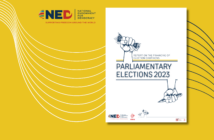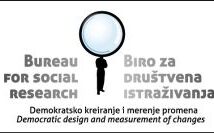Freedom of Information (FOI), as an integral part of every MANS’ program, is one of key prerequisites for scrutinizing transparency and public accountability of the government. Sound implementation of the FAI Law is a vital tool in fight against corruption, which is recognized as the most significant obstacle to the European integration of our country.
MANS monitors implementation of FAI legislative through extensive use of all legal mechanisms to obtain documents from institutions at all levels, mobilization of citizens to use their rights and provision of free legal aid, strategic litigation and advocacy campaigns based upon concrete cases.
In 2011 we have submitted over 12.000 FAI requests and since December 2005, when the Law was adopted, we have filed over 43.000 requests. In 2011 we received 42% of requested documents, and well over three quarters of all requested information were obtained in the course of seven years of Law implementation.
Compared to 2010, we managed to both double the number of sent requests annually, as well as to improve the responsiveness of the institutions.
In 2011 MANS submitted over 3.000 appeals to supervisory institutions. On average, supervisory institutions acted in more than 80% of cases and made over 80% of all the decisions in our favor. Since FOI Law is in force we have submitted over 9.000 appeals. Graph 2: Responses to complaints (2011)
During reporting period we have submitted over 2.000 cases to the Administrative Court, and over 7.000 in the seven year period. At the same time, in 2011 the Court made decisions in 68% of the submitted cases, out of which 81% of the decisions were in favor of MANS.
Since FOI Law is in force, the Court made decisions in 74% of all the cases, and 76% of them were in MANS’ favor. We have also submitted over 300 cases to the Supreme Court which made decisions in 95% of cases, and 30% of those decisions were in our favor.
Additionally, in 2011 we have submitted 470 complaints to the Protector of human rights – Ombudsman for the cases where institutions did not comply with the Administrative court verdicts. Ombudsman had acted upon 68% of our urgencies with 95% of favorable decisions, ordering that institutions decide upon court rulings on an expedited basis.
We have also initiated 41 Administrative procedures in front of the Administrative inspection in cases where institutions did not comply with decisions of the second instance bodies. Accordingly, the Administrative inspection acted upon 95% of submitted initiatives out of which 15% were in our favor, while for others the Inspection denied its jurisdiction.
Throughout 2011, MANS organized awareness raising campaigns all across Montenegro in order to mobilize citizens to use the FAI Law. In June, we distributed over 6000 leaflets in seven Montenegrin municipalities. On the occasion, citizens were offered to fill in request for information and they were provided with basic legal assistance in requesting information and complaining to supervisory institutions.
MANS organized a set of street performances on 28th and 29th of September 2011, which were held in 20 different municipalities in order to celebrate the International Right to Know Day. On this occasion MANS distributed over 10.000 leaflets on crucial provisions of the FAI Law in terms of citizens’ rights, but also we distributed a wide range of campaign materials including, t-shirts, hats umbrellas and key chains with the logo of the campaign. Consequently over 50 citizens submitted over 70 different requests for information.
We also distributed 1500 leaflets that were specifically addressed to civil servants and employees from over 40 public authorities. Leaflets were designed to inform and encourage the employees of those authorities to use the FAI Law and seek answers regarding any aspect of conduct of institutions they work in.
In 2011, we have issued the first Report on the transparency levels of public institutions. The Report presented analysis of institutional capacities to act upon the FAI Law, their willingness to provide information that is both of administrative nature, as well as more substantial information, such as budget spending, employment records, public procurement etc.
The report contains a list of institutions with the most and least capacities in the FAI Law implementation. Consequently, diplomas were given to national and local institutions with the most and least capacities. This report was announced and presented in major national printed and electronic media and was instantaneously commented by various institutions that were covered by the report.
The Ministry of Economy, that was perceived as the national institution with least capacities, expressed their concern and promised to significantly improve their FAI Law implementation in the future.
Aiming to give an insight into the current implementation of the FAI Law, MANS issued two bilingual reports that provide basic information about the implementation this Law, and point to specific cases of its violation by state authorities
We developed an on-line form, available on MANS’ web site , that allows all interested citizens to fill in a request for free access to information. Citizens are encouraged to submit requests using a simple fill-in form. After submitting a request, citizens receive an e-mail that informs them of actions that are taken by our team and are provided with a response as it becomes available.
Also, all requests that are received by this method, as well as responses, are available on our web site. This form was an instant success and, during 2011, was used by more than 100 persons.
MANS established the Network for cooperation which currently consists of sixteen NGOs and eight journalists that have signed a Cooperation agreement with MANS. The network is established with the aim to improve abilities of the civil sector to implement the FAI Law. Regular meetings with NGO Members are held and a mailing list was set up for members of the Network, where everyone involved can share their experiences, questions, seek legal advice etc.
One of the main results of our cooperation is submission of many requests to public authorities, especially by those NGOs and journalists that did not have experience on this matter.



